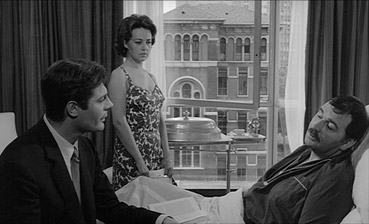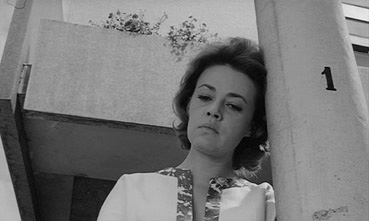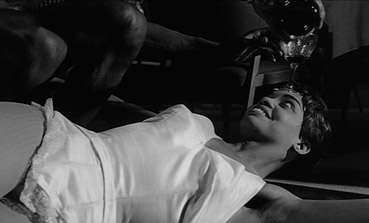|
Michelangelo Antonioni is the sort of filmmaker for whom the term 'acquired taste' could almost have been invented, and it's one that I've washed around my palette over the years and have yet to come to a final conclusion on. I admire his artistry, am fascinated by his aural and visual style, but find myself sometimes straining to fully engage with his characters and stories. I'd make an exception for his trend-setting 1966 thriller Blow-Up, whose investigation into what may or may not constitute photographic evidence of murder was compellingly handled, and set the style and standard for a slew of subsequent works venturing into similar generic waters. I'll also freely admit that I've seen only a small percentage of the director's output, hardly enough to judge a life's work. But I'm working on it. Really.
Until the DVD release under examination here, La Notte was one of the Antonioni films I'd heard about but never seen. The story, such as it is, follows acclaimed author Giovanni and his wife Lidia through the course of a single day and night as their once loving marriage slips into its death throes. There's no drama to this, no raging arguments or accusations, just two people maintaining the pretence of mutual attraction but whose love for each other has crumbled beyond emotional repair. Symbolic of their relationship is their dying friend Tommaso, whom the couple visit in hospital in the opening scene, and whose later passing coincides with Lidia's recognition that her lost love for Giovanni has eroded her own will to live.

La Notte does not just observe characters on the edge of isolation and despair, it emotionally aligns itself to them. Despite the equality of screen time given to Giovanni and Lidia, it's the emotional vacuum into which the latter steadily descends that defines the film's tone and provides it with one of its most strangely effective scenes. Uncomfortable at a party being thrown to mark the release of her husband's latest novel, Lidia goes for a long walk in Milan streets that are transformed by her own reality dislocation into an expressionistic, almost alien landscape. Intermittently devoid of everyday sounds and at times even life itself, everything she encounters feels somehow reflective of her inner turmoil – a broken clock, decaying buildings, rusted metal, starkly blank concrete walls, a crying child – and are given a surrealist twang by their presentation, with even a street brawl having a strangely ritualistic aspect that Lidia is first drawn to and then calls to an anguished halt. A brief window into the couple's past is provided when she observes the launching of rockets in a field close to where they used to live, a memory that proves fond enough to prompt Giovanni to join her.
At the night-time garden party that occupies the film's second half, the couple's drift apart is amplified as both are exposed to alternatives to their present relationship. Giovanni chases after the young and attractive Valentina, while Lidia is pursued by the good-looking Roberto. Neither seems destined to succeed or at least bring any real pleasure or satisfaction – there's a whiff of middle-aged desperation to Giovanni's attempts at seduction, and Lidia has by this point become an isolated figure unable to connect in any way with the hubbub of the surrounding party.
You can probably gather from the above that La Notte is not a film designed to send viewers from the cinema with idealistic smiles on their faces, but that shouldn't be a problem for any but the delusional optimists in the audience. One of the strengths of any art form is its ability to reflect all aspects of the human experience and to prompt contemplation as a well as an emotional response. La Notte certainly achieves that, but in the process of doing so does leave itself open to attack from those unsympathetic to Antonioni's approach. With the narrative stripped to its bare bones, the subtext and symbolism are brought to the fore, making it easy for a cynical viewer to shoot both down in flames. Take Lidia's aforementioned observations during her walk around town, effective moments that could nonetheless be accused hammering the point home, the broken clock a reminder of the time she and Giovanni have been together and the breakdown of their relationship, the rusted metal a symbol of her emotional decay, the crying child a reflection of her own inner despair, and so on. But that's the nature of symbolism – deconstruct it out loud in a cynical voice and you can make every example sound like statement of the obvious. But these aspects work in La Notte precisely because that association does not immediately leap out at you, but collectively registers in the way such things do in the real world.

A trickier sell is the lack of tonal modulation, resulting in a film whose mood and pace vary little throughout and remain locked into the mindset of its lead characters, particularly Lidia. It's this more than anything that makes La Notte a film that is likely to bore as many as it enthrals, and frankly I can appreciate both views. Once again the artistry of Antonioni and his team is compelling in itself, from Gianni Di Venanzo's beautifully composed monochrome cinematography to a soundtrack in which silence plays as important a role as the dialogue. But despite two excellent, under-the-skin performances from Marcello Mastroianni and Jeanne Moreau, I'm not sure I ever really connected with the characters on a meaningful level, or cared too deeply for their woes.
But I can't get the damned thing out of my head. In his essay in the accompanying booklet, Brad Stevens' appraisal of the film includes a number of questions to which he offers no answers, and I seriously had to resist the temptation to do likewise. For whole sequences when little seems to be happening I was inexplicably gripped, notably a café scene involving a slow jazz band and a wine glass-balancing erotic dancer that reeks so much of Wild at Heart that I'd be astonished if David Lynch wasn't one of its biggest fans.
A spotless 1.66:1 anamorphic transfer whose only compromise is a minor trade-off between black levels and shadow detail – adjust your screen for solid blacks and you're likely to lose just a little picture information. There's a faint flicker to some scenes but it's only detectable at all on large areas of single tone and detail is very good. On the whole, though, a very nice job.

The Dolby 2.0 mono soundtrack shows its age without exhibiting any major problems – the dynamic range is limited and the level is a little low, but clarity and stability are fine, and there's no trace of background hiss.
Original Trailer (3:01)
The original Italian trailer is in sparkling shape, though suggests a faster paced film than you'll get.
Booklet
A question-peppered essay on the film by Brad Stevens and a scrapbook of related information bookend a sizeable interview with Antonioni, taken from a transcript of a question and answer session that took place in Rome on 16th March 1961 at the Centro Sperimentale di Cinematografia during a retrospective of the director's work to that date. The interview covers a lot of ground but the focus is on La Notte and its common ground-sharing cinematic predecessor L'avventura.
In his accompanying essay, Brad Stevens acknowledges the difficulty that Antoinioni's films pose for the viewer, but suggests that their treasure is revealed and the emotional connection made with their characters through multiple viewings,* something I'll admit I've yet to attempt with La Notte. It is, unquestionably, a fascinating cinematic work, but whether its artistic strength runs deep or occupies only the surface layers is a tough call and one that seems designed to provoke discussion. No problems with the DVD, though – a little light on extras, but a strong transfer and a typically fine booklet from Masters of Cinema.
* Turns out he was right. See my review of the Blu-ray release of the film here.
|